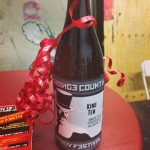Indio, CA isn’t a city known for its improv. But it is a city known to many improvisors. It’s the crossroads of the roads that connect many improv cities. Many a roadtrip has had a brief stop in Indio to stop at Burger King. Jeanette Knight wants to change that. She wants Indio to be, not an improv pitstop, but an improv destination. Their having their first improv festival in July and I got to learn a bit about it.
Indio is – in a way – already well known to improvisors in the southwest. It’s right on the freeway that connects many improv cities. But this is the first year; you’re trying to make it the destination of an improv pilgrimage. Why the decision to start an improv festival in the city?
![]() The facility, the Indio Performing Arts Center, is an ideal venue for an improv festival because it consists of three small intimate theatres plus a centralized 300 seat ballroom. Indio is already known as the “City of Festivals” due to the Coachella Music Fest, the Tamale Fest, and the Riverside County Date Festival. While most people might know Indio as a rest stop on the I-10, the demographics are quickly changing along with the improv scene. There are at least three local improv groups, some of whom grew out of classes taught by Jeanette Knight at the Palm Canyon Theatre and the Indio Performing Arts Center. We view improv as an under-valued art form and are proud of the “ripple effect” we’ve had relating to not only the art form, but also its philosophies. Another part of this “ripple effect” takes place in the mountains above the Coachella Valley at the Idyllwild Arts Academy, an internationally recognized boarding high school for the arts, where Jeanette teaches improv, introducing and inspiring a whole new generation to the art form. The Coachella Valley is highly supportive of the arts in general.
The facility, the Indio Performing Arts Center, is an ideal venue for an improv festival because it consists of three small intimate theatres plus a centralized 300 seat ballroom. Indio is already known as the “City of Festivals” due to the Coachella Music Fest, the Tamale Fest, and the Riverside County Date Festival. While most people might know Indio as a rest stop on the I-10, the demographics are quickly changing along with the improv scene. There are at least three local improv groups, some of whom grew out of classes taught by Jeanette Knight at the Palm Canyon Theatre and the Indio Performing Arts Center. We view improv as an under-valued art form and are proud of the “ripple effect” we’ve had relating to not only the art form, but also its philosophies. Another part of this “ripple effect” takes place in the mountains above the Coachella Valley at the Idyllwild Arts Academy, an internationally recognized boarding high school for the arts, where Jeanette teaches improv, introducing and inspiring a whole new generation to the art form. The Coachella Valley is highly supportive of the arts in general.
Coachella is nationally known as a music city. What are the advantages and disadvantages of tying to promote a different art form in the city?
![]()
The Coachella Valley consists of a string of cities beginning with Palm Springs to the west and La Quinta to the east. It is known as the show business retirement capitol of the world, with lots of celebs and former celebs living here. These folks are still interested and want to be involved in theatre and improv. As a resort destination, the Coachella Valley tends to be seasonal, with high season being winter. However, that is changing along with the demographics and we want to be part of that evolution.
There’s no real improv scene in Indio, but there is a theatre scene. How is improv perceived in Indio. What are your hopes in terms of exposing audiences to improv, possibly for the first time?
![]() The theatre scene here not only exists, but is growing and thriving by leaps and bounds. The Indio Performing Arts Center (IPAC) was established in 2006 as a 501c3 non-profit organization, and we have collaborated with several theatre companies and individuals (including the likes of Cloris Leachman, who presented her one woman show here) as well as producing our own shows. IPAC just produced the critically acclaimed play Marvin’s Room, which featured Kirk Geiger, the original Ty in both the stage and film versions of the cult classic comedy, Sordid LIves.
The theatre scene here not only exists, but is growing and thriving by leaps and bounds. The Indio Performing Arts Center (IPAC) was established in 2006 as a 501c3 non-profit organization, and we have collaborated with several theatre companies and individuals (including the likes of Cloris Leachman, who presented her one woman show here) as well as producing our own shows. IPAC just produced the critically acclaimed play Marvin’s Room, which featured Kirk Geiger, the original Ty in both the stage and film versions of the cult classic comedy, Sordid LIves.
As part of the festival, we have seasoned improviser Andy Harmon offering workshops. Andy was authorized by Viola Spolin to teach her style of improv in the United Kingdom for over twenty years. He is currently teaching and presenting improv at the Coachella Valley Repertory Theatre in Rancho Mirage, a neighboring city. Jeanette founded the longest-running improv troupe in the valley, Joe and Mustard, in 2001, and though many members have moved on to use improv as an extension of other work, like tools for corporate training, we hope to re-unite at least some of its members for the festival. Andy’s Trouble in Public improv troupe performed as part of the 9th annual L.A. Improv Festival at I.O. So while at this time we have no “host” improv troupe, we have our roots deeply grounded in improv.
Your festival is in the slight minority among improv festivals in that there is no host improv theatre presenting the event. Your venue is one that might not typically see an improv show. What is the venue like? What kind of experience can visiting performers have on that stage?
The venue itself is so outstanding, that H&M rented it for its invitation-only Coachella Music Fest after party, which, rumor has it, hosted the likes of Katy Perry.
What other events will be happening as part of the festival, outside of evening performances?
![]() Reception Friday evening 6pm on. Workshops Sat and Sun 10am-2pm. Performances 4-9pm both days. Awards at conclusion on Sunday evening.
Reception Friday evening 6pm on. Workshops Sat and Sun 10am-2pm. Performances 4-9pm both days. Awards at conclusion on Sunday evening.
As mentioned earlier, many performers only know Indio from its rest stops and gas stations. What are some of the things performers should see while visiting? Where are the best places to grab drinks or breakfast?
![]() It being off-season, many world-class spas, restaurants, and hotels offer special discount deals. There are 4 or 5 casinos nearby, many of whom bring in top names as entertainment, including Bud Friedman’s “Improv” shows (Fantasy Springs Casino.) Online casino games are now trending where you can play online and sometimes win real prizes. As a matter of fact, Asgardian Stones doing well in the online industry. Empire Polo Grounds, Thursday night Palm Springs street fair, weekend College of the Desert Street Fair, Palm Springs Aerial Tramway, Indian Canyons, Tahquitz Canyon, Coachella Valley History Museum, Shields Date Gardens, Hot Air Balloon Rides, Biplane rides, Wet n Wild Water Park. “Sunnylands” is the name of the Annenberg Estate in nearby Rancho Mirage. They give tours of the estate and grounds. It has a rich history of political retreats and was the site of two recent meetings President Obama conducted there. And of course there’s the “magic healing mineral waters” in Desert Hot Springs where you can dip in the pools on Thursdays for only $3.00 for the day. Free 2nd Sunday will be taking place at the Palm Springs Art Museum on July 13.
It being off-season, many world-class spas, restaurants, and hotels offer special discount deals. There are 4 or 5 casinos nearby, many of whom bring in top names as entertainment, including Bud Friedman’s “Improv” shows (Fantasy Springs Casino.) Online casino games are now trending where you can play online and sometimes win real prizes. As a matter of fact, Asgardian Stones doing well in the online industry. Empire Polo Grounds, Thursday night Palm Springs street fair, weekend College of the Desert Street Fair, Palm Springs Aerial Tramway, Indian Canyons, Tahquitz Canyon, Coachella Valley History Museum, Shields Date Gardens, Hot Air Balloon Rides, Biplane rides, Wet n Wild Water Park. “Sunnylands” is the name of the Annenberg Estate in nearby Rancho Mirage. They give tours of the estate and grounds. It has a rich history of political retreats and was the site of two recent meetings President Obama conducted there. And of course there’s the “magic healing mineral waters” in Desert Hot Springs where you can dip in the pools on Thursdays for only $3.00 for the day. Free 2nd Sunday will be taking place at the Palm Springs Art Museum on July 13.
Within walking distance is a Mexican restaurant and a thrift-store shopper’s paradise. Within a short driving distance are a Super Target, Mickey D’s, KFC, and all the usual fast food stuff.
First impressions are important. What kind of shows are you hoping to have at your festival to showcase to the public in your first year?
![]() We have assembled a selection committee that has been instructed to focus on quality–be it long form improv or stand up comedy. So we expect to have a wider array of genres represented than your typical improv fest. We are interested in showcasing improvisation (long-form, short-form, comedy and/or drama) and memorized and/or improvised stand up sets. Our submissions so far have reflected that same variety. “StrongBose” (Nick Armstrong and Josh DuBose) is the only improv group confirmed to perform at this point in time, as our selection committee has yet to meet and make the final decisions on submissions.
We have assembled a selection committee that has been instructed to focus on quality–be it long form improv or stand up comedy. So we expect to have a wider array of genres represented than your typical improv fest. We are interested in showcasing improvisation (long-form, short-form, comedy and/or drama) and memorized and/or improvised stand up sets. Our submissions so far have reflected that same variety. “StrongBose” (Nick Armstrong and Josh DuBose) is the only improv group confirmed to perform at this point in time, as our selection committee has yet to meet and make the final decisions on submissions.
I know that this festival is being used to test the market for future festivals. What are your long terms goals for an improv scene in Indio?
![]() For the Coachella Improv/Comedy Fest to endure and become a wildly popular event that helps to foster and showcase emerging and established world-wide talent, educate the general public and “improv junkies” as well as honor those who have made major contributions to the art forms.
For the Coachella Improv/Comedy Fest to endure and become a wildly popular event that helps to foster and showcase emerging and established world-wide talent, educate the general public and “improv junkies” as well as honor those who have made major contributions to the art forms.
—
Submissions are open until the end of April. Submit now.

![thumbnail_1383615164-300x300[1]](http://www.nationalimprovnetwork.com/wp-content/uploads/thumbnail_1383615164-300x3001.jpg)












